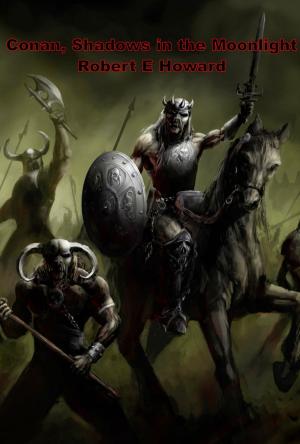| Author: | Charles Alden Seltzer | ISBN: | 1230000388252 |
| Publisher: | Starling and Black | Publication: | April 25, 2015 |
| Imprint: | Starling and Black | Language: | English |
| Author: | Charles Alden Seltzer |
| ISBN: | 1230000388252 |
| Publisher: | Starling and Black |
| Publication: | April 25, 2015 |
| Imprint: | Starling and Black |
| Language: | English |
Many disquieting thoughts oppressed Miss Sheila Langford as she halted her pony on the crest of a slight rise and swept the desolate and slumberous world with an anxious glance. Quite the most appalling of these thoughts developed from a realization of the fact that she had lost the trail. The whole categorical array of inconveniences incidental to traveling in a new, unsettled country paled into insignificance when she considered this horrifying and entirely unromantic fact. She was lost; she had strayed from the trail, she was alone and night was coming.
She would not have cared so much about the darkness, for she had never been a coward, and had conditions been normal she would have asked nothing better than a rapid gallop over the dim plains. But as she drew her pony up on the crest of the rise a rumble of thunder reached her ears. Of course it would rain, now that she had lost the trail, she decided, yielding to a sudden, bitter anger. It usually did rain when one was abroad without prospect of shelter; it always rained when one was lost.
Well, there was no help for it, of course, and she had only herself to blame for the blunder. For the other—not unusual—irritating details that had combined to place her in this awkward position she could blame, first Duncan, the manager of the Double R—who should have sent someone to meet her at the station; the station agent—who had allowed her to set forth in search of the Double R without a guide,—though even now, considering this phase of the situation, she remembered that the agent had told her there was no one to send—and certainly the desolate appearance of Lazette had borne out this statement; and last, she could blame the country itself for being an unfeatured wilderness.
Something might be said in extenuation of the station agent’s and the Double R manager’s sins of omission, but without doubt the country was what she had termed it—an unfeatured wilderness. Her first sensation upon getting a view of the country had been one of deep disappointment. There was plenty of it, she had decided,—enough to make one shrink from its very bigness; yet because it was different from the land she had been accustomed to she felt that somehow it was inferior. Her father had assured her of its beauty, and she had come prepared to fall in love with it, but within the last half hour—when she had begun to realize that she had lost the trail—she had grown to hate it.
Many disquieting thoughts oppressed Miss Sheila Langford as she halted her pony on the crest of a slight rise and swept the desolate and slumberous world with an anxious glance. Quite the most appalling of these thoughts developed from a realization of the fact that she had lost the trail. The whole categorical array of inconveniences incidental to traveling in a new, unsettled country paled into insignificance when she considered this horrifying and entirely unromantic fact. She was lost; she had strayed from the trail, she was alone and night was coming.
She would not have cared so much about the darkness, for she had never been a coward, and had conditions been normal she would have asked nothing better than a rapid gallop over the dim plains. But as she drew her pony up on the crest of the rise a rumble of thunder reached her ears. Of course it would rain, now that she had lost the trail, she decided, yielding to a sudden, bitter anger. It usually did rain when one was abroad without prospect of shelter; it always rained when one was lost.
Well, there was no help for it, of course, and she had only herself to blame for the blunder. For the other—not unusual—irritating details that had combined to place her in this awkward position she could blame, first Duncan, the manager of the Double R—who should have sent someone to meet her at the station; the station agent—who had allowed her to set forth in search of the Double R without a guide,—though even now, considering this phase of the situation, she remembered that the agent had told her there was no one to send—and certainly the desolate appearance of Lazette had borne out this statement; and last, she could blame the country itself for being an unfeatured wilderness.
Something might be said in extenuation of the station agent’s and the Double R manager’s sins of omission, but without doubt the country was what she had termed it—an unfeatured wilderness. Her first sensation upon getting a view of the country had been one of deep disappointment. There was plenty of it, she had decided,—enough to make one shrink from its very bigness; yet because it was different from the land she had been accustomed to she felt that somehow it was inferior. Her father had assured her of its beauty, and she had come prepared to fall in love with it, but within the last half hour—when she had begun to realize that she had lost the trail—she had grown to hate it.















